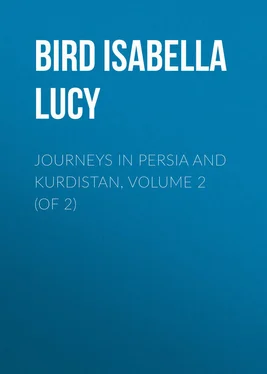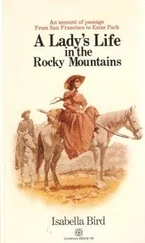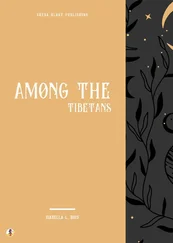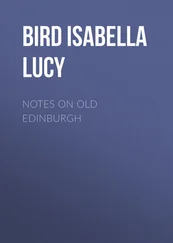Isabella Bird - Journeys in Persia and Kurdistan, Volume 2 (of 2)
Здесь есть возможность читать онлайн «Isabella Bird - Journeys in Persia and Kurdistan, Volume 2 (of 2)» — ознакомительный отрывок электронной книги совершенно бесплатно, а после прочтения отрывка купить полную версию. В некоторых случаях можно слушать аудио, скачать через торрент в формате fb2 и присутствует краткое содержание. ISBN: , Жанр: foreign_language, foreign_antique, foreign_prose, Путешествия и география, на английском языке. Описание произведения, (предисловие) а так же отзывы посетителей доступны на портале библиотеки ЛибКат.
- Название:Journeys in Persia and Kurdistan, Volume 2 (of 2)
- Автор:
- Жанр:
- Год:неизвестен
- ISBN:http://www.gutenberg.org/ebooks/38828
- Рейтинг книги:5 / 5. Голосов: 1
-
Избранное:Добавить в избранное
- Отзывы:
-
Ваша оценка:
- 100
- 1
- 2
- 3
- 4
- 5
Journeys in Persia and Kurdistan, Volume 2 (of 2): краткое содержание, описание и аннотация
Предлагаем к чтению аннотацию, описание, краткое содержание или предисловие (зависит от того, что написал сам автор книги «Journeys in Persia and Kurdistan, Volume 2 (of 2)»). Если вы не нашли необходимую информацию о книге — напишите в комментариях, мы постараемся отыскать её.
Journeys in Persia and Kurdistan, Volume 2 (of 2) — читать онлайн ознакомительный отрывок
Ниже представлен текст книги, разбитый по страницам. Система сохранения места последней прочитанной страницы, позволяет с удобством читать онлайн бесплатно книгу «Journeys in Persia and Kurdistan, Volume 2 (of 2)», без необходимости каждый раз заново искать на чём Вы остановились. Поставьте закладку, и сможете в любой момент перейти на страницу, на которой закончили чтение.
Интервал:
Закладка:
Unfortunately, in one of the many attempted fights among the horses, Screw kicked her on the chest and fore-leg a few days ago, which has made a quarrel between Hadji, Screw's owner, and Aziz. Now Aziz is making me a slave to his animal. That night, after a tiring day, I was sleeping soundly when I was awakened by Aziz saying I must come to his mare or he would stay behind with her the next day. This is his daily threat. So I had to bring her inside my tent, and sleepily make a poultice and bandage the hurt. I have very little vaseline, and after putting it twice on the slight graze on her chest, which it cured, I said, when he asked for it a third time, that I must keep the rest for men. "Oh," he said, "she's of more value than ten men." Lately he said, "I don't like you at all, you give me many things, but you don't give me money; and I don't like the Agha, he doesn't give me half enough. I'm going back to-morrow, and then you'll be robbed of all your things, and you'll wish you had given them to me."
When I do anything, such as opening a whitlow, which he thinks clever, he exclaims, "May God forgive your sins!" This, and "May God forgive the sins of your father and mother!" are ejaculations of gratitude or surprise. One day when I had been attending to sick people for four hours, I asked him which was the more "meritorious" act, attending to the sick or going on pilgrimage? He replied, "For a Kafir no act is good," but soon added, " Of a truth God doesn't think as we do , I don't know."
Yesterday he came for plaster, and while I cut it he saw a padlock pincushion with a mirror front on my bed, and said, "You've given me nothing to-day, you must give me that because my mare kicked me." But I like him. He is a brave fellow, and with a large amount of the mingled simplicity and cunning of a savage has a great deal of thought, information, and ability, and a talk with him is worth having.
Mirab Khan had promised that not only guides but his son would accompany the Agha, but when I arrived at his eyrie the next morning it was evident that something was wrong, for the Agha looked gloomy, and Mirab Khan uncomfortable, and as I was dressing the wound of the snake-bitten man, the former said, "So far as I can see, we are in a perfect hornets' nest." Neither son nor guides were forthcoming. It was necessary to use very decided language, after which the Khan professed that he had withheld them in order to compel us to be his guests, and eventually they were produced.
I called again on the ladies, who received me in a sort of open stable, horses on one side and women on the other, in a crowd and noise so overpowering that I was obliged to leave them, but not before I had been asked for needles, scissors, love philtres, etc. Polygamy, besides being an atrocious system, is very hard on a traveller's resources. I had brought presents for four legitimate wives, but not for the crowd of women who asked for them. Each wife wanted to get her present unknown to the others. Later they returned my visit, and were most importunate in their requests.
When I went to say farewell to the Khan I found him on his knees, bowing his forehead to the earth upon a Mecca prayer-stone, and he concluded his prayers before he spoke – not like many of us, who would jump up ashamed and try to seem as if we never demeaned ourselves by an act of devotion. His village, Diz Arjanak, has a Diz, or stronghold, with a limited supply of water. It is the raison d'être of his residence there. This Diz consists of a few shelves or cavities, chiefly artificial, scooped out in the face of the perpendicular cliff above the village. They are only attainable by a very difficult climb, have no internal communication, and would not hold more than 150 people. In one cavity there is a small perennial spring. The largest recess is said to be twelve feet deep by about twenty long, and has a loop-holed breastwork across the entrance. In case of attack the Khan and the people provision this hiding-place, and retire to it, believing it impregnable.
Mirab Khan on this and a later occasion complained, and apparently with good reason, of grinding exactions on the part of Persia. The Isawands, like the Magawes and Zalakis, pay their tribute partly to Burujird and partly to the Ilkhani. The sum formerly fixed and paid was 150 tumans . It was raised to 300, which was paid for two years. Now, he says, this year's demand (1890) is for 500.
We left Diz Arjanak rather late in the afternoon, ascended a valley which opens out beyond it, forded the green bright waters of the Mauri Zarin, and crossed beautiful open hillsides and elevated plateaux on its right bank till we lost it in a highly picturesque gorge. Some miles of very pleasant riding brought us to a rocky and dangerous path along the side of a precipice above the river Badush, so narrow as to involve the unloading of several mules, and a bad slip and narrow escape on the part of mine. The scenery is singularly wild and severe. Crossing the Badush, and ascending a narrow ravine through which it flows, we camped at its source at the junction of two wild gullies, where the Sahib, after sundry serious risks, had already arrived. We did not see a single camp after leaving Arjanak, and were quite unmolested during a halt of two nights; but it is an atmosphere of danger and possible treachery.
Camp Badush, at a height of 9100 feet, though shut in by high mountains, was cool – a barren, rocky, treeless spot. A great deal of bituminous shale was lying about, which burned in the camp-fires fairly well, but with a black heavy smoke and a strong smell.
The limestone fragments which lay about, on being split, emitted a powerful odour of bitumen. Farther up the gully there is a chalybeate spring, and the broken fragments of the adjacent rocks are much stained with iron. After a restful halt we retraced our route by a low path which avoided the difficult precipices above the Badush, forded it several times, crossed a low pass, descended to the valley of the Mauri Zarin, forded the river, and marched for some miles along its left bank, till the valley opened on great grassy slopes, the skirts of the rocky spurs which buttress the grand mountain Shuturun, the "Camel Mountain," so called from its shape. It was a very uninteresting march, through formless gravelly hills, with their herbage all eaten down, nothing remaining but tamarisk scrub and a coarse yellow salvia. There were neither camps nor travellers; indeed, one need never look for camps where there is no herbage.
This is a charming camping-ground covered with fine turf, damp, I fear, and some of the men are "down" with fever and rheumatism. There is space to see who comes and who goes, and though the altitude is only 8400 feet, last night was quite cool. Ischaryar, Aziz Khan's devoted young servant, the gentlest and kindest Bakhtiari I have seen, became quite ill of acute rheumatism with fever, and felt so very ill and weak that he thought he was going to die. I sent some medicine to him, but he would not take it, saying that his master had spoken unkindly to him, and he had no wish to live. However, this morbid frame of mind was overcome by firm dealing, and Aziz attended to him all night, and salol, etc., are curing him.
He is the one grateful creature that I have seen among these Orientals, and his gratitude is in return for a mere trifle. We were fording a stream one hot day, and seeing him scooping up water with difficulty in his hands, I took out my mug for him. Ever since he has done anything that he can for me. He brings tasteful little bouquets of flowers, gathers wild cherries, and shows the little courtesies which spring from a kindly nature. He said several times to Mirza, "It isn't only that the Khanum gave me the cup, but she took trouble for me." It may be imagined what a desert as to grateful and kindly feeling I am living in when this trifle appears like an oasis. Hard, cunning, unblushing greed is as painful a characteristic of the Bakhtiaris as it is of the Persians.
Читать дальшеИнтервал:
Закладка:
Похожие книги на «Journeys in Persia and Kurdistan, Volume 2 (of 2)»
Представляем Вашему вниманию похожие книги на «Journeys in Persia and Kurdistan, Volume 2 (of 2)» списком для выбора. Мы отобрали схожую по названию и смыслу литературу в надежде предоставить читателям больше вариантов отыскать новые, интересные, ещё непрочитанные произведения.
Обсуждение, отзывы о книге «Journeys in Persia and Kurdistan, Volume 2 (of 2)» и просто собственные мнения читателей. Оставьте ваши комментарии, напишите, что Вы думаете о произведении, его смысле или главных героях. Укажите что конкретно понравилось, а что нет, и почему Вы так считаете.












